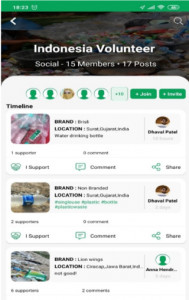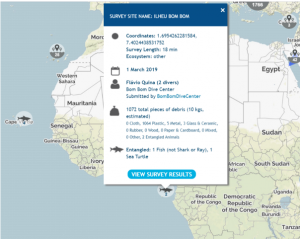Life under water: our O2 factory
In 2019, we have been the powerless witnesses of record-breaking deadly fire crises. For the last three months, Australia’s fires have released 350 million metric tons of CO2 into the atmosphere. It is an estimated of one per cent of the total global carbon emissions from 2019. Protecting, managing and restoring our terrestrial ecosystems is one of the priorities but it should not hide what is happening to our marine habitats, the ocean is facing unprecedented crises. Both need our attention, urgent actions and policy changes.
 There is a common belief that forests and trees are the main oxygen producers – in fact most of Earth’s oxygen (70 per cent) in the atmosphere is produced by marine plants. The real lungs of our planet is not the Amazon, it’s the ocean, the largest ecosystem on Earth and the major heat and carbon sink. Life under water is then more critical than ever to mitigate climate change.
There is a common belief that forests and trees are the main oxygen producers – in fact most of Earth’s oxygen (70 per cent) in the atmosphere is produced by marine plants. The real lungs of our planet is not the Amazon, it’s the ocean, the largest ecosystem on Earth and the major heat and carbon sink. Life under water is then more critical than ever to mitigate climate change.
The ocean produces oxygen through marine plants – phytoplankton, kelp, and algal plankton. These plants produce oxygen as a byproduct of photosynthesis, a process which turns CO2 and sunlight into sugars the organism can use for energy.
The ocean’s health faces many threats including warming, acidification, overfishing, habitat destruction and pollution. There is an emergency to restore and protect our coral reefs and the abundance of our marine life if we want to keep our primary O2 factory in order.
The mysterious journey of the plastic sea monster
According to Ocean Conservancy, eight million metric tons of plastics enter our ocean every year joining the estimated 150 million metric tons that have accumulated in our marine system.
By damaging under water ecosystems, plastic pollution reduces the ocean’s capabilities to regulate the climate, and also affects fishing livelihoods and nature-based tourism. An estimated 820 million people rely on fisheries as a source of income to support food security. Also, according to UNEP, at least 275 million people depend directly on reefs for livelihoods and sustenance making communities dependant on reef-related tourism particularly vulnerable to plastic pollution.
The majority of marine litter comes from lands, but according to a new report by Greenpeace abandoned, lost or discarded fishing gear (ALDFG) would be the biggest plastic polluter in the ocean. More than 640,000 tonnes of plastic nets, lines, pots and traps used in commercial fishing are dumped and discarded in the sea every year, the same weight as 50,000 double-decker buses.
So what do we actually know about marine plastic pollution? Is there enough real data available? Where does the plastic come from? Where does it end up? How far does it travel? Where are the most polluted areas? Who are the brands behind plastic single use items discarded in nature? Its journey remains little understood and under-researched – stakeholders who want to see the end of plastic pollution are craving data to drive global changes.
Data-science tools for environmentally-conscious citizens
In the GSMA’s CleanTech Programme we are continuing to explore opportunities for digital technology to act as an enabler for developing countries’ transition towards low-carbon, climate-resilient economies. In our last blog post we highlighted a few examples of best practice and innovation in plastic waste management, and through our ongoing research we have come across additional tech innovators that are opening new ways to tackle plastic waste in our oceans.
 The mission of Ellipsis is to map the distribution of litter by drone surveying and machine learning to collect accurate data of solid waste pollution, locally and globally.
The mission of Ellipsis is to map the distribution of litter by drone surveying and machine learning to collect accurate data of solid waste pollution, locally and globally.
Their technologies address the lack of detailed information on plastic litter after entering the ocean and aims to identify the 99 per cent of invisible and untraceable plastic debris underwater. Ellipsis drone’s pilots scan rivers and coastlines, aerial images are then digitally processed to create heatmaps of hotspots that help to direct clean-up and prevention resources. Also, acting as an environmental consultancy, the company supports changes of policy and legislation by providing their data and analysis to local, corporate and governments stakeholders.
 The brand new citizen app ACTNOW is using the power of social media and smartphones to help fight plastic pollution.
The brand new citizen app ACTNOW is using the power of social media and smartphones to help fight plastic pollution.
The aim is to collect data on plastic waste dumped into the natural environment and to discover both the brands behind plastic litter and the most polluted locations. Everyone with a smartphone can take part in the project by simply taking a photo during day to day life, and uploading it to the app to contribute to the database. There is also the option to create groups and work together as a team.
The data then can be used by environmental organisations, to make companies and governments aware of their responsibility in the aim to change existing legislation and policies in the way plastic is disposed, manufactured and used.
 Dive Against Debris® is the flagship program of Project AWARE a nonprofit organisation working with volunteer scuba divers. Since 2011, more than 50,000 volunteers have participated in Dive Against Debris in 114 countries around the world, reporting over one million pieces of trash. Dive Against Debris both improves the health of ocean ecosystems through volunteer efforts and gathers valuable data about underwater debris. Volunteers can download the app and report their data via smartphones after their dives. The global database helps support the development and implementation of policies to improve waste management, locally and globally.
Dive Against Debris® is the flagship program of Project AWARE a nonprofit organisation working with volunteer scuba divers. Since 2011, more than 50,000 volunteers have participated in Dive Against Debris in 114 countries around the world, reporting over one million pieces of trash. Dive Against Debris both improves the health of ocean ecosystems through volunteer efforts and gathers valuable data about underwater debris. Volunteers can download the app and report their data via smartphones after their dives. The global database helps support the development and implementation of policies to improve waste management, locally and globally.
From a different tech perspective but with the same sustainable goal, the multi-award winning Ichthion has developed cutting-edge technologies to restore the ocean environment by removing plastic waste before it enters marine habitats. Their technologies have also been designed to provide data of the plastic they extract, which they use to discuss effective circular strategies and drive policies with governmental actors.
In 2020, GSMA Clean Tech Programme will continue to bring together mobile operators, tech innovators, donors and the international development community to mitigate the impacts of climate change with a view to foster long-term collaborations. To this end, our team aims to identify digital and mobile solutions that help manage natural resources, plastic and e-waste. Stay tuned – and please get in touch if you wish to share your initiatives with us!



